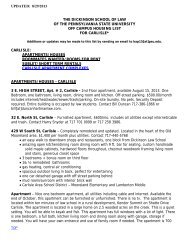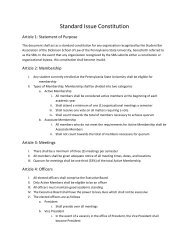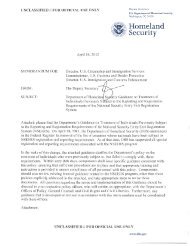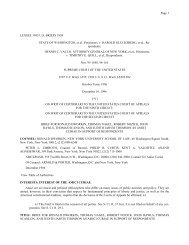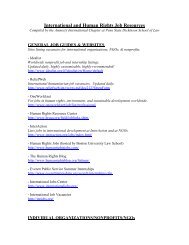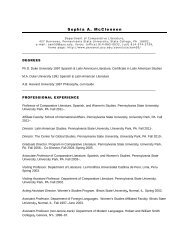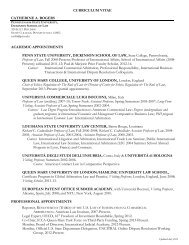Page 1 of 4 James M. Dubik Lieutenant General ... - Penn State Law
Page 1 of 4 James M. Dubik Lieutenant General ... - Penn State Law
Page 1 of 4 James M. Dubik Lieutenant General ... - Penn State Law
You also want an ePaper? Increase the reach of your titles
YUMPU automatically turns print PDFs into web optimized ePapers that Google loves.
<strong>Page</strong> 1 <strong>of</strong> 4<br />
<strong>James</strong> M. <strong>Dubik</strong><br />
<strong>Lieutenant</strong> <strong>General</strong><br />
U.S. Army (Retired)<br />
President/CEO<br />
<strong>Dubik</strong> Associates, LLC<br />
7218 Ludwood Court<br />
Alexandria, Virginia 22306<br />
Civilian Education.<br />
--BA, Gannon University, Philosophy<br />
--MA (All But Dissertation), the Johns Hopkins University, Philosophy<br />
--MA, the Command and <strong>General</strong> Staff College, Fort Leavenworth, Kansas, Military Arts<br />
and Sciences<br />
--Massachusetts Institute <strong>of</strong> Technology, National Security Fellowship<br />
--Harvard JFK School <strong>of</strong> Government. Executive program, national security<br />
--Maxwell School <strong>of</strong> Government, Syracuse University, Executive program, national<br />
security<br />
Significant cross-cultural experience.<br />
Iraq, Afghanistan, Japan, Korea, Thailand, Bosnia, Haiti, United Kingdom, France, Italy,<br />
Germany, and Poland.<br />
Current portfolio.<br />
1. President and CEO, <strong>Dubik</strong> Associates, LLC. A consulting firm formed in 2008<br />
with Sharon L. Basso. The firm consults on matters <strong>of</strong> national security issues;<br />
strategic planning—military, intelligence, government, and business; leader<br />
development; and media and Congressional relations.<br />
2. Senior Fellow, the Institute <strong>of</strong> Land Warfare. I write a monthly article in Army<br />
magazine, published by the Association <strong>of</strong> the United <strong>State</strong>s Army. Examples <strong>of</strong><br />
my essays are, “Another Cycle,” “A National Strategic Learning Disability,” and<br />
“On Denial and Its Consequences.” My last monograph is “Lessons from Lincoln,<br />
On Being a War President.” All are available on line at www.ausa.org.<br />
3. Senior Fellow, the Institute for the Study <strong>of</strong> War. I conduct research, write, brief,<br />
and conduct media interviews on behalf <strong>of</strong> the Institute in the following areas:<br />
ways to improve U.S. and allied training <strong>of</strong> indigenous security forces in<br />
Afghanistan, Iraq, and elsewhere; counterinsurgency doctrine; and changes in the<br />
nature, conduct, and understanding <strong>of</strong> war. Reports published by the Institute—<br />
“Building Security Forces and Ministerial Capacity: Iraq as a Primer.”<br />
“Accelerating Combat Power in Afghanistan,” “Creating Police and <strong>Law</strong><br />
Enforcement Systems,” and “The U.S. in Iraq Beyond 2011”—are available at
<strong>Page</strong> 2 <strong>of</strong> 4<br />
www.understandingwar.org. Also available on the Institute’s web site are his most<br />
recent media interviews. Am currently writing a monograph entitled, “Operational<br />
Art in Counterinsurgencies,” due for publication by the end <strong>of</strong> 2011.<br />
4. Senior Advisor to the Executive Director as well as a Board Member and Trustee<br />
<strong>of</strong> the National Leadership Roundtable on Church Management. I assist in<br />
developing long range strategic goals for this non-pr<strong>of</strong>it organization whose<br />
mission is to assist the Catholic Church in America in improving management and<br />
leadership practices. I also help the organization in translating strategic goals into<br />
measurable objectives and tasks, in constructing an efficient and effective<br />
organization, and aligning resources with the organization and strategic plan. A<br />
view <strong>of</strong> this organization can be found at www.nlrcm.org.<br />
5. Senior Advisor, Tucker Associates, LLC. I advise and the CEO on strategies to<br />
bring US businesses into Iraq. In this capacity, we bring together American firms<br />
with Iraqi business partners. Our most recent trip to Baghdad, October 2011,<br />
resulted in a potential $49M contract for the company we represented.<br />
6. Special Advisor to GENERALs David Petraeus in Afghanistan and Lloyd Austin<br />
in Iraq (when each was Commanding in their respective theaters <strong>of</strong> war). I provide<br />
confidential assessments and recommendations concerning the growth and<br />
development <strong>of</strong> the Afghan and Iraqi National Security forces, military and police.<br />
7. Consultant to the Assistant Secretary <strong>of</strong> Defense for International Security Affairs;<br />
In this capacity, I provide confidential reports and assessments concerning a wide<br />
variety <strong>of</strong> subjects.<br />
8. Member, Council on Foreign Relations, Washington, DC.<br />
9. Member, the National Security Advisory Council, U.S. Global Leadership<br />
Coalition, Washington, DC.<br />
10. Omar Bradley Chair for Strategic Leadership, 2012-13. Co sponsored by<br />
Dickenson College, <strong>Penn</strong> <strong>State</strong> <strong>Law</strong> School, and the US Army War College which<br />
involves teaching one course at each institution.<br />
11. Member, U.S. Army Ranger Hall <strong>of</strong> Fame. Selected in 2012.<br />
12. Lecturer. Adjunct lecturer at Georgetown University’s Security Studies Program.<br />
In addition, I have lectured at the following academic institutions: University <strong>of</strong><br />
Virginia, the Johns Hopkins University’s School <strong>of</strong> Advanced International Study,<br />
University <strong>of</strong> Maryland, George Washington University, George Mason<br />
University, The Jefferson Education Society, the US Army School <strong>of</strong> Advanced<br />
Military Studies, the Army War College; and the National War College,<br />
Washington, D.C.
<strong>Page</strong> 3 <strong>of</strong> 4<br />
Executive leadership experiences. Over 37 years <strong>of</strong> continuous active duty culminating<br />
in more than ten years <strong>of</strong> effective, values-based executive management and leadership.<br />
Proven change leader and strategic thinker. Practiced in successfully working with senior<br />
governmental, corporate, and military leaders <strong>of</strong> many nations—sometimes in very<br />
difficult and sensitive conditions. Exercised responsible stewardship <strong>of</strong> billions <strong>of</strong><br />
dollars.<br />
1. 2007-8. Commanding <strong>General</strong>, Multi-National Security Transition Command—<br />
Iraq and NATO Training Mission—Iraq. Baghdad, Iraq. Senior US <strong>of</strong>ficial<br />
responsible for training and equipping the Iraqi military and police forces. $5B<br />
budget. Coordinated with Iraqi, American, NATO, and other national senior<br />
governmental and military <strong>of</strong>ficials. Main innovation: accelerated the fielding<br />
and training <strong>of</strong> the Iraqi security forces to meet US strategic objectives.<br />
2. 2004-7. Commanding <strong>General</strong>, I US Corps. Fort Lewis, Washington. Senior<br />
American Army operational commander in the Pacific region. Responsible for<br />
training 40,000 soldiers for war as well as for developing or continuing military<br />
relationships with Korea, Japan, and Thailand. $600 M budget. Main<br />
innovations: created a global, distributed, peer-learning environment to accelerate<br />
learning among Stryker units in Hawaii, Alaska, Germany, <strong>Penn</strong>sylvania, and<br />
Washington <strong>State</strong> and began new family programs to reduce stress on spouses and<br />
children <strong>of</strong> deployed service members—both now being adopted throughout the<br />
army.<br />
3. 2002-4. Commanding <strong>General</strong>, Joint Laboratory, Joint Forces Command,<br />
Norfolk, Virginia. Senior US military <strong>of</strong>ficial responsible for the development<br />
and execution <strong>of</strong> US and multi-national experimentation that included France,<br />
Germany, Canada, Australia, and the U.K. $110 M budget. Main innovations:<br />
Created two experimental areas—prototype experimentation to focus on nearterm<br />
products and concept experimentation to provide insights into potential longterm<br />
security investments. Created and led a distributed, virtual, multi-service,<br />
and multi-national team to manage this program.<br />
4. 2000-2. Commanding <strong>General</strong>, 25 th Infantry Division and US. Army Hawaii,<br />
Sch<strong>of</strong>ield Barracks, Hawaii. Senior US Army commander in the <strong>State</strong> <strong>of</strong> Hawaii<br />
responsible for training 15,000 soldiers for global contingency missions. $ 300 M<br />
budget. Interacted with state governmental, business, environmental, and cultural<br />
leaders as well as senior US military commanders in Hawaii. Main innovation:<br />
negotiated in 2001-2 land use, land purchase, information architecture, and<br />
construction agreements necessary to field and train a Hawaiian Stryker Brigade<br />
in 2005-6. Model also used in Alaska, Germany, Washington, and <strong>Penn</strong>sylvania.<br />
5. 1999-2000. Deputy Commanding <strong>General</strong> for Transformation, US Army<br />
Training and Doctrine Command, Fort Lewis, Washington. Senior leader
<strong>Page</strong> 4 <strong>of</strong> 4<br />
responsible for creating the most technologically advanced combat unit in the US<br />
Army. Also developed accelerated learning and leader development<br />
methodologies as well as began the installation <strong>of</strong> a training and learning<br />
information infrastructure necessary for this program. $1B budget. As the lead<br />
executive, personally reported to three army 4-stars and integrated supporting<br />
actions across the Army. Main innovation: setting all aspect <strong>of</strong> this project in<br />
place—equipment, training, management structures and procedures, and<br />
information architecture—in one year.<br />
6. 1998-9. Deputy Commanding <strong>General</strong>, Multi-National Division (North), Bosnia-<br />
Herzegovenia. Tuzla, Bosnia. Deputy commanding general responsible for the<br />
security <strong>of</strong> one-third <strong>of</strong> Bosnia-Herzegovina. Supervised the execution <strong>of</strong><br />
operations and support <strong>of</strong> forces from six nations—Russia, Poland, Turkey,<br />
Sweden, Finland, and Denmark. Major innovation: seated the first post-war<br />
government in Srebrenica and implemented the Dayton Accords Agreement in the<br />
district <strong>of</strong> Brcko.<br />
7. 1997-8. Director <strong>of</strong> Training, Headquarters Department <strong>of</strong> the Army. The<br />
Pentagon, Washington, DC. Senior Army executive responsible for the funding<br />
<strong>of</strong> all Army training world-wide. $10B program. Major innovation: began the<br />
process <strong>of</strong> divesting the army from legacy training methods and investing in more<br />
advanced training and learning systems.<br />
Other relevant experiences.<br />
1. Teaching. Graduate level instruction in military arts and sciences at the Army’s<br />
School <strong>of</strong> Advanced Military Studies, Fort Leavenworth, Kansas—1991-92.<br />
Undergraduate instruction in ethics, ethics and leadership, history <strong>of</strong> philosophy,<br />
and political philosophy at the United <strong>State</strong>s Military Academy, West Point, New<br />
York—1982-85.<br />
2. Publishing. Published over 80 articles, essays, and monographs. Wrote a series<br />
<strong>of</strong> articles and monographs starting in 1989 that focused on the impact <strong>of</strong> the post<br />
Cold War and emergence <strong>of</strong> the information age on leadership, strategy, and<br />
military organizations and operations. Wrote the introduction to Rethinking the<br />
Principles <strong>of</strong> War.<br />
3. Operational Experience. Have commanded during operations in Haiti, Bosnia,<br />
and Iraq.<br />
Hobbies. Exercise (have completed four ultra-marathons), biking, golf, guitar, reading,<br />
and writing.




